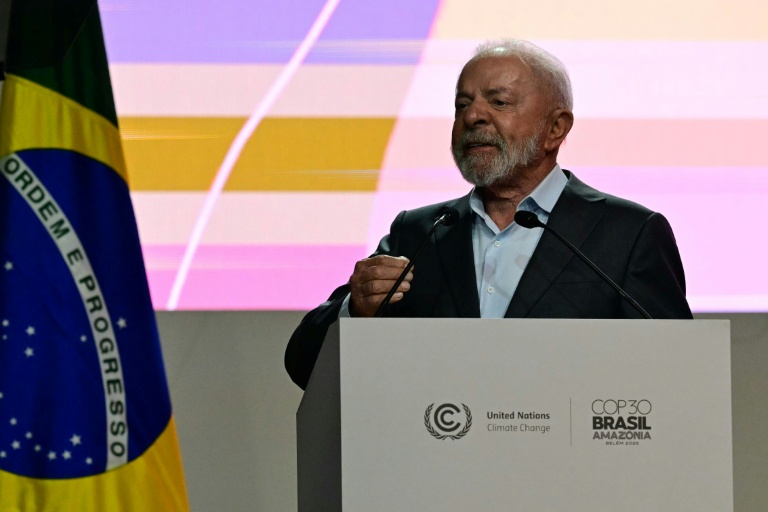World
Lula Urges Nations to Finalize Climate Deal at COP30 in Brazil

Brazilian President Luiz Inacio Lula da Silva arrived in Belem on Wednesday to advocate for a swift agreement among negotiators at the United Nations climate talks, known as COP30. With the conference scheduled to conclude in just two days, Lula’s presence aims to elevate discussions on key contentious issues where nations remain divided.
The Brazilian government released a draft pact on Tuesday, expressing hopes for a consensus on critical matters by Wednesday. This late-stage intervention by a head of state is unusual at the annual gathering, reflecting Lula’s commitment to making COP30 a pivotal moment in climate negotiations. He has characterized this conference as a “COP of truth,” emphasizing the need for action against climate denial.
Negotiations Face Significant Challenges
Lula’s agenda includes meetings with representatives from emerging economies, European nations, island states, Indigenous groups, and civil society organizations. The head of COP30, Brazilian diplomat Andre Correa do Lago, has urged negotiators to work tirelessly to bridge gaps between wealthy nations, developing countries, and oil-rich states.
Central to the negotiations are disagreements regarding the implications of trade measures, the transition from fossil fuels, and the demand for developed nations to increase climate finance for poorer countries. These issues have proven to be significant sticking points as nations strive to reach an agreement.
French Minister for Ecological Transition Monique Barbut expressed skepticism about the feasibility of reaching a decision on Wednesday. In a statement to AFP, she said, “No, there will not be a COP decision today. I don’t see how that could happen.” While acknowledging some progress, Barbut noted that a comprehensive package is still necessary for consensus.
Funding Disputes Loom Large
The draft agreement highlights a clear divide between coalitions advocating for a “roadmap” to phase out fossil fuels, led by European and island nations, and a counter-group of oil-producing countries. Wopke Hoekstra, the EU climate commissioner, emphasized that the terminology used in the discussions is less important than the underlying agreement on fossil fuel reduction, stating, “Whether we’re going to call it the roadmap or we’re going to use a different wording, I think is secondary.”
Negotiators are also grappling with demands from developing countries for increased financial support from wealthier nations to help vulnerable regions adapt to climate change and transition to renewable energy sources. However, many EU countries, facing economic challenges and rising debt, have opposed calls for enhanced climate finance. Irish Climate Minister Darragh O’Brien clarified, “We’re not looking at any increases in adaptation finance.”
A new text is expected to be released on Wednesday, with COP30 officially concluding on Friday. Historically, climate summits often extend beyond their scheduled end dates, reflecting the complexities of these international negotiations.
With approximately 2,400 staff members from over 100 nationalities involved in the event, COP30 represents a significant global effort to address the urgent challenges of climate change. As negotiations continue, the eyes of the world remain focused on the outcomes of this critical summit.
-

 Science3 months ago
Science3 months agoToyoake City Proposes Daily Two-Hour Smartphone Use Limit
-

 Top Stories3 months ago
Top Stories3 months agoPedestrian Fatally Injured in Esquimalt Collision on August 14
-

 Health3 months ago
Health3 months agoB.C. Review Reveals Urgent Need for Rare-Disease Drug Reforms
-

 Technology3 months ago
Technology3 months agoDark Adventure Game “Bye Sweet Carole” Set for October Release
-

 World3 months ago
World3 months agoJimmy Lai’s Defense Challenges Charges Under National Security Law
-

 Lifestyle3 months ago
Lifestyle3 months agoVictoria’s Pop-Up Shop Shines Light on B.C.’s Wolf Cull
-

 Technology3 months ago
Technology3 months agoKonami Revives Iconic Metal Gear Solid Delta Ahead of Release
-

 Technology3 months ago
Technology3 months agoApple Expands Self-Service Repair Program to Canada
-

 Technology3 months ago
Technology3 months agoSnapmaker U1 Color 3D Printer Redefines Speed and Sustainability
-

 Technology3 months ago
Technology3 months agoAION Folding Knife: Redefining EDC Design with Premium Materials
-

 Business3 months ago
Business3 months agoGordon Murray Automotive Unveils S1 LM and Le Mans GTR at Monterey
-

 Technology3 months ago
Technology3 months agoSolve Today’s Wordle Challenge: Hints and Answer for August 19









